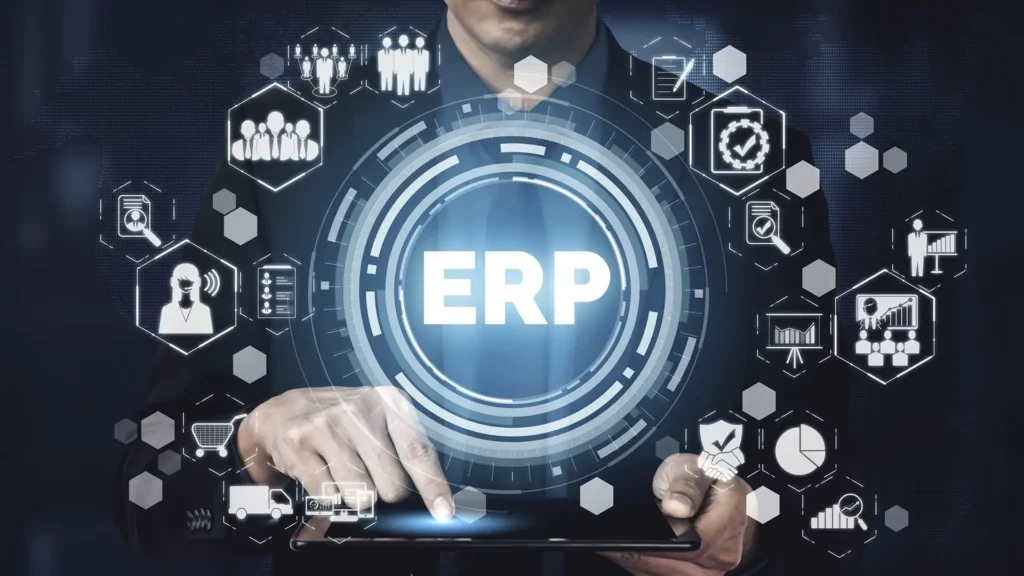Also known as a management system, ERP is a tool that provides several benefits for companies in the most varied segments. This issue happens because the platform helps businesses to be more productive and to have comprehensive knowledge of organizational needs, facilitating decision making.
I imagine that you are interested in knowing more about the topic. With that in mind, in this post we highlight what ERP is, we inform you about the applications of the management system and the types of companies that use the tool. Keep with us.
What is ERP?
The ERP (Enterprise Resource Planning) or Integrated Business Management System, translating into our language, refers to software that helps to improve the administration of companies.
This question is addressed through the automation of processes and integration of different areas of the company. These can be, for example, questions related to finance, sales, accounting, logistics, purchasing, among others.
It is worth noting that the platform has the advantage of centralizing information in a single location. In this way, it becomes possible to have access to valuable insights and make assertive decisions, contributing to the growth of the business.
What are the ERP system modules?
The system has several modules and they can vary according to the needs of each business. Among the main modules are:
- stock
- financial
- invoicing
- HR
- Supervisor
- project management
On this subject, it is also important to highlight that there is the possibility of customizing the tool's functionalities according to the needs of your organization.
It is noteworthy that the ERP will be a great ally in storing information, creating a robust database. In this way, it becomes possible to have more assertiveness and security when making important decisions for the future of your business.
What types of companies use ERP?
Much is thought that ERP is only intended for large companies, as the tool deals with a large volume of information and helps in obtaining valuable insights.
However, the management system can be used by companies of the most varied sizes and market segments and we will highlight this issue below.
Small and medium-sized companies
We know that in small and medium-sized companies it is very common for managers to dedicate themselves to operational and management activities simultaneously. This issue can jeopardize the viability of the business and jeopardize growth.
In this context, ERP is very useful, as it helps in monitoring organizational processes. With this, it becomes possible to have knowledge of the progress of activities, to have an overview of the business and to develop professional management.
E-commerce
Also known as virtual stores, e-commerces are booming. This happens because the consumer market is expanding on the internet and there are several possibilities in which people can buy different goods in Brazil.
ERP is very useful for online stores, as it helps organize a large volume of data and also updates information quickly and efficiently.
offices
There are many independent professional offices, but many of them do not have software to optimize internal processes. As a result, they lose the opportunity to streamline the control of accounts payable and receivable, learn about sales indicators, monitor productivity indicators, etc.
ERP is very useful for offices (accounting, law, among others), as it helps professionals to reduce time with bureaucratic activities and they will be able to focus on strategic business activities, contributing to the use of productivity.
Retail
ERP integrates and automates store processes. This ensures faster and more efficient operations, which contributes to increasing the business's profit margin.
Industries
In industries, the integrated management platform helps to optimize operational efficiency, improve planning and even helps in the development of strategic actions. These issues, added together, contribute to a fast and efficient growth of the business.
What are the main advantages of an ERP?
The management system has numerous functionalities and the tool provides several positive aspects for companies. Many of these benefits are related to productivity gains, cost reductions and transparency in operations.
Automation
One of the main positive aspects provided by ERP is that it reduces the time required or even eliminates bureaucratic and repetitive activities. In addition, there is the automation of various tasks. With this, it becomes possible to standardize processes and ensure agility in your daily life.
cost reduction
The tool integrates data from different business sectors, facilitating access to information. With this, managers will be able to monitor the money available in cash, helping to optimize the management of financial resources.
In this way, it becomes possible to develop appropriate strategies to reduce expenses without jeopardizing productivity. This can be done through various strategies, such as controlling inventory levels, cutting superfluous costs, etc.
Integration
The management system enables the integration of tools and facilitates data monitoring by managers. In addition, you will be able to monitor the performance of several departments simultaneously.
With this, complete, reliable and comprehensive information is obtained. This data will be great allies in decision making, contributing to the growth of your business.
Transparency
The software provides transparency and security to business processes. This is because all activities are centralized on a dashboard, facilitating the monitoring of the work of each organizational segment.
error reduction
The management system helps to reduce the number of failures and errors. As a result, there is a reduction in rework, helping to improve productivity and reduce costs.
As you can see, ERP is a tool that offers several benefits for companies. For this reason, businesses from the most varied segments have used the system, as it helps to optimize the organization's management.
For this reason, we try to introduce you to the main characteristics of ERP so that you can be knowledgeable about the subject and, consequently, can use it in order to favor the growth of your business.
Was this content in which we highlighted on what ERP is useful for you? Follow us on social media and receive more relevant content on the topic. We're on Instagram and LinkedIn .




